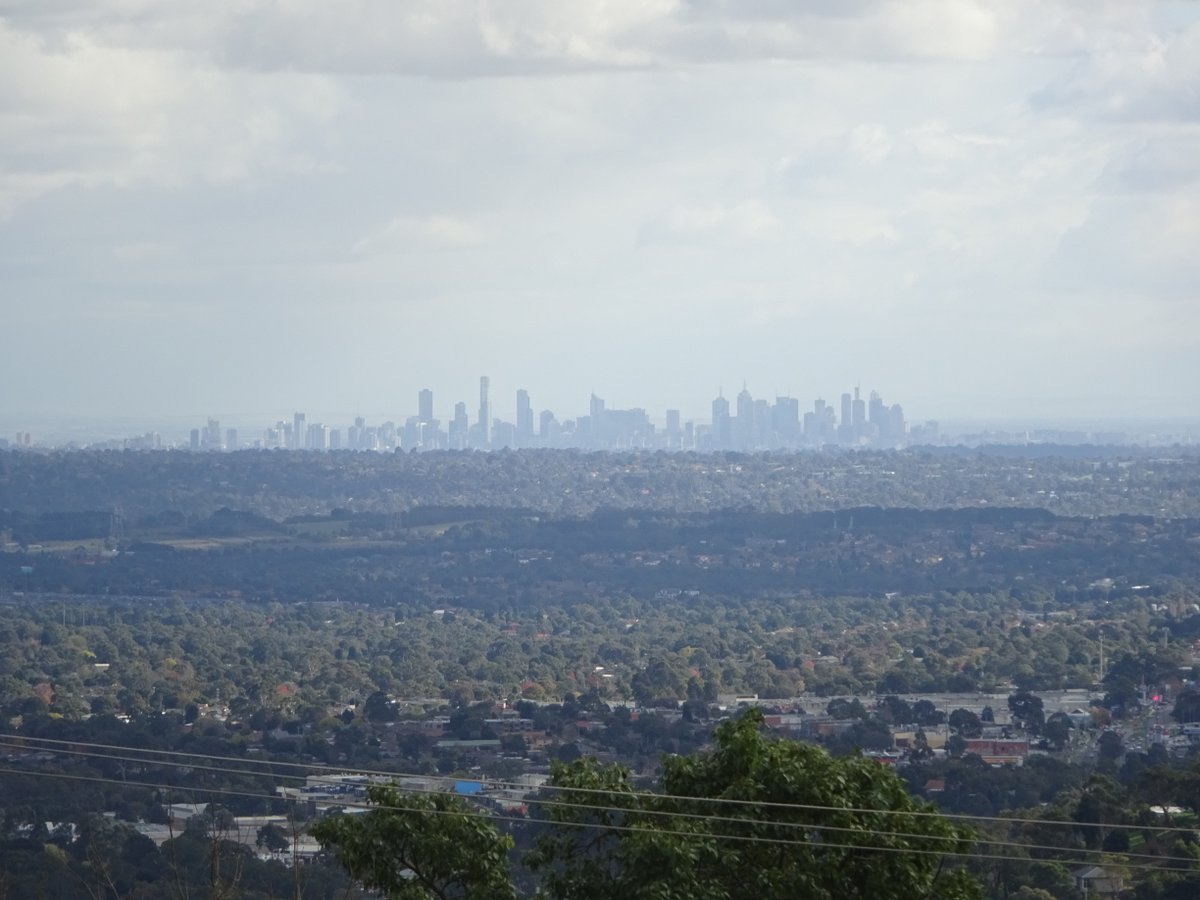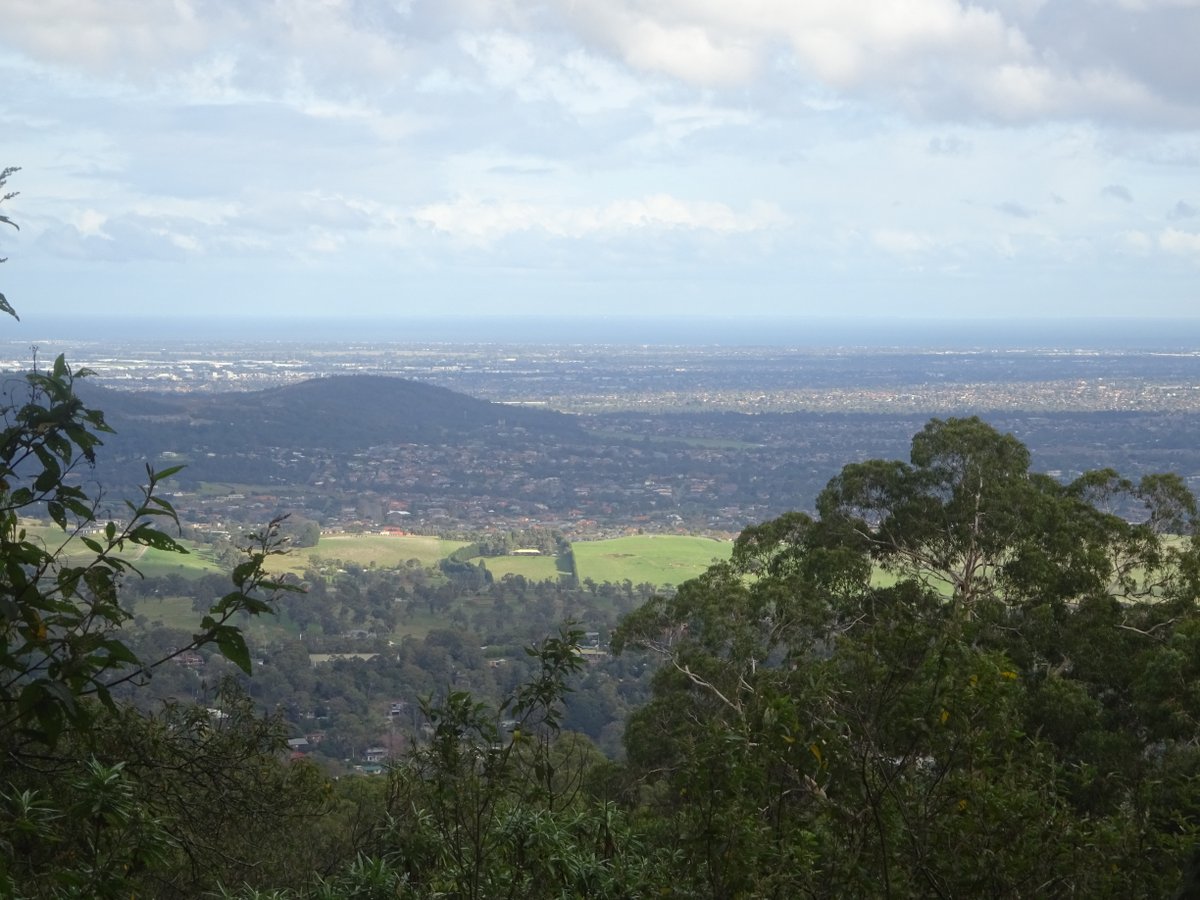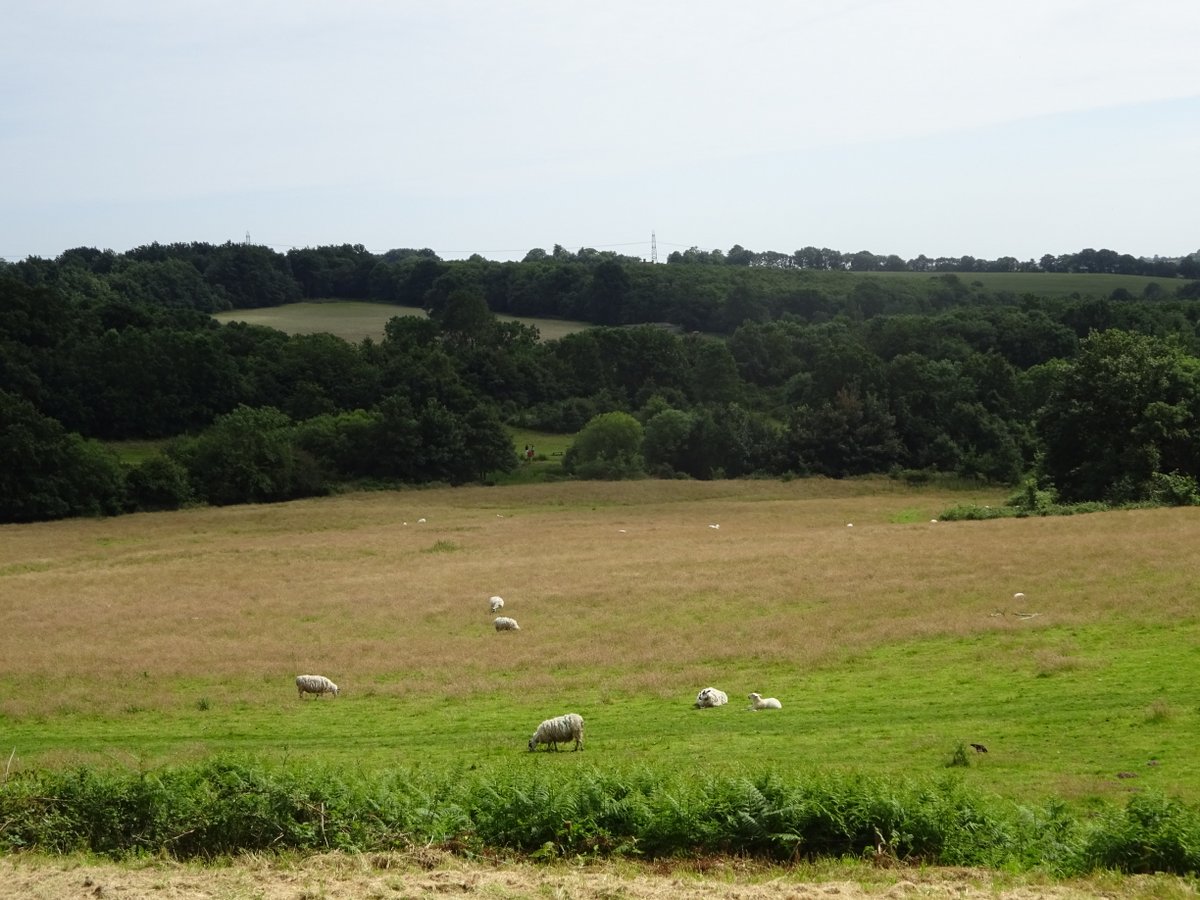A license to look down on others
As a proud member of the Dandenong Ranges community, I have the right to look down on others. And all it takes is a short walk to put me in a position to do so. The grand vista, the pure mountain air, the absolutely natural gravel and asphalt paths: everything testifies to my superior position as I look down on the mortals below. Up here, I am free and surrounded by views. Down there is a flat plain stretching out to the city, with the occasional bump pretending to be a hill. And doubtless that plain is filled with countless humans scurrying back and forth like ants on whatever minor projects occupy them.
This experience of looking down on others got me to thinking about hill-climbing, about seeking views, about linguistics, and about comparing ourselves with others.
Hiking in the Dandenong Ranges
In the last few weeks I’ve walked during the day, at sunset, and at midnight. Each time has involved enjoyable walking and a variety of views. Take for example these pictures from last week:


Today was no exception, and I saw both the distant city and the mundane train station which carries me to work in the Flatlands.
The views get even better up at Mount Dandenong, particularly at SkyHigh and at the nearby Burke’s Lookout. In good conditions you can see the bay, the You Yangs, and the Macedon Ranges. You can also see a nice sunset, though don’t expect to be the only person in the audience.

Closer to home, night changes the view to a vast array of points of light, stretching all the way to the distant city. And even the main tourist road is almost deserted after midnight and available for walkers - a big improvement on the busy weekend traffic.
Real Estate
Directly opposite my viewpoint for today was a “For Sale” sign, but I think the agent missed a trick. While they include such choice phrases as “Picture Perfect Views”, “stunning views”, and “hills living”, they forget to mention this license to look down on others. Maybe it’s not considered polite to have such an open show of privilege? Or maybe it’s an insider secret, that only true hills residents can realise?
I compared with houses for sale in Toorak, and even there real estate agents haven’t realised the joy of looking down on others (though I was amused by one which said it was “an address offering ideal proximity to prestigious schools”). Again, maybe it’s just not done? Or maybe anyone looking to live there already knows the privileges they should expect?
Hill-climbing
It seems to be a human thing to climb hills (and trees) in search of a better view, perhaps of a better perspective. And certainly for me even when I find a view I’m likely to keep looking. Perhaps there’s a certain amount of “the grass is greener on the other side of the fence”.
Many battles have been fought over the possession of hills, even when those hills aren’t that much higher than the surrounding country. Take for example the site of the Battle of Hastings. It’s steeper than it looks, and actually had the top levelled after the battle to build the now ruined Battle Abbey. But there are plenty of steeper and more important places in England.

Finding the right view
Ultimately, though, you need to know what kind of view you’re looking for, because it’s not always the highest places that get the best views. If you want to see the sunset, don’t try an east-facing slope. If you want a wide-angle view, don’t go to a forested slope (unless you know of a place where the trees have been cleared). If you’re on a plateau, try the edge of the plateau, not the small bump that makes the highest spot on the plateau. If you want to see a close-up view, don’t go off to a distant mountain.
For example, to see the main Melbourne CBD lights you may be better off with viewpoints in Yarra Bend or in Royal Park. They’re not as high as the Dandenong Ranges, but they get better views because they’re closer. And don’t even think of going to Kosciuszko: It may be the highest mountain in Australia, and it may have lovely views of the Australian Alps, but you can’t see Melbourne from there.
Linguistics
Talking about “looking down on people” raises interesting linguistic questions: what do we actually mean? Obviously, I started this post talking about physical elevation: when I stand on a hill, I look down on people. But I think we hardly ever use the phrase that way.
If we were talking about someone looking down on others because of the suburb they live in, we would be more likely to be talking about someone from Toorak (maximum elevation 70m), rather than talking about someone in the Dandenong Ranges near SkyHigh (elevation 633m). It’s the same with “looking up to someone”: it may be physically true, particularly for children, but we would tend to use it just to talk about respect. If someone were to say that they were literally looking down on someone, we would probably assume they meant the figurative meaning of despising them.
Comparing ourselves with others
Sherpas have done a brilliant job of conquering the top of the world, and of helping tourists and explorers do the same. However, I think we would all agree that they are not better people than the rest of the world just because they live higher above sea level. Nor are the tribes living in the Ethiopian Highlands or in the Andes. Yes, they are better equipped for dealing with high elevations and low oxygen levels than most humans (pro-tip: hiking above 4,000m is hard). It’s just that that’s not a very useful skill in Australia, or indeed in most parts of the inhabited world.
However, I think it’s very tempting to try and build a scale, then measure the worth of people by where they fall on that scale. We don’t even realise we’re doing it. Something like:
- I have the highest net worth - it’s just economics.
- I have the most power - it’s just politics.
- I have the greatest intelligence - it’s just IQ.
- I’m from a superior race / have better genetics - it’s just science.
Most of these are somewhat objective measures - but so is how high above sea level a person is. It sounds ridiculous to think someone is a better person because they’re standing on a slightly higher hill. And yet, some of these other measures of worth are measures we instinctively use in the real world. Even if we make them completely objective, how do we know they will tell us about the worth of an individual? Or about how to compare individuals?
In our haste to be top of the scale, I think we can forget how being on top blinds us. Just remember, Sherpas don’t get a better view of Melbourne because they can climb Everest. To strain the analogy, maybe those who are rich or powerful or intelligent are not in the best position to understand the lives of those closer to the bottom. The danger is the spirit of “Let them eat cake”. It is convenient to assume that success is solely due to hard work or dedication or natural superiority, and easy then to look down on those who haven’t achieved. But the reality is that there are many things partially or completely outside of our control which can affect whether we are successful, and we may not even have the same opinion as to what success is.
How do we really measure people?
Can we say someone is a better person because they got a higher number on a carefully defined scale? To make this work, we would need to define one number that expresses the worth of a person. It might be wealth, it might be power, it might be intelligence, or it might be a weighted average of scores on a hundred different categories.
But we are never going to get agreement on it. For example, sometimes the rich both exploit the poor and look down on them for being exploited. But really, is the paranoid and unhappy tycoon better off than the poor but happy worker? How would we measure it? Maybe we need to go really radical and use some subjective standard like happiness or contentment?
Even if we limit it to some kind of achievement or success, I’m not sure we can have a single scale. Take for example my work colleagues. There are many areas to our job, and if I am comparing myself with others I am sure to find that I am better in some areas than them, and they are better in some areas than me. I could define a metric that valued my strengths and put less stress on my weaknesses. Doing that would make me feel superior, but how would it actually help? Really, it’s not a zero sum game. I don’t need to determine someone else is worse to make myself better. If we can work together, we can both be better off.
Part of my problem with the thought of looking down on people is if it makes you unable to learn from them. As I said, there are many things that some of my colleagues do better than me. I would prefer to try to learn from them (or delegate to them :-) ) rather than trying to figure out a way to look down on them for having a skill I don’t.
Let’s look at some of the suggested scales above:
- If I take an economic benchmark, I say that I can’t possibly learn anything from those less well off than me.
- If I take a race benchmark, I say that I can’t possibly learn from those from a different country or with a different cultural background from me.
- If I take a power benchmark, I say that as a team leader I couldn’t possibly learn anything from my subordinates, and that I have to just obey my superiors without question.
Is that really what we want? And can we really reduce people to numbers and compare them?
Conclusion
It’s very easy to look down on others, and it can make us feel better about ourselves. But working together and learning from each other can actually make us better.
Oh, and if you want to see how flat most of Melbourne really is, come join us up in the Dandenong Ranges and look down on the Flatlands below.